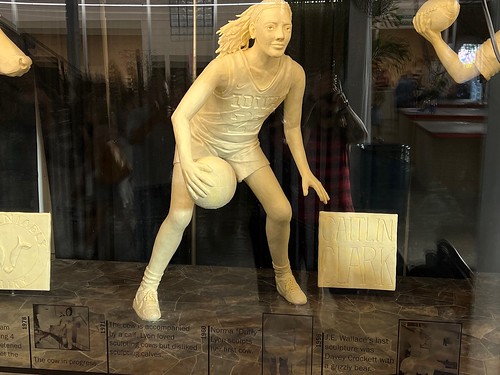Caitlin Clark adds to her legacy, passing LSU’s Pete Maravich for NCAA scoring record
Caitlin Clark #CaitlinClark

‘‘Legacy’’ is a loaded word.
How a person defines the term is subjective.
People have been trying to define Caitlin Clark’s legacy for years, which is saying a lot, considering she’s only 22 years old and has a WNBA career on the horizon. When you’ve accomplished what Clark has, however, the need to define it this early is warranted.
On Sunday, Clark’s 35-point performance in No. 6 Iowa’s 93-83 victory against No. 2 Ohio State in Iowa City moved her past Pete Maravich and into first place on the NCAA’s all-time scoring list. Forget gender classifications. Clark has scored the most points in major-college basketball, period.
Certainly, that is what will define her legacy, right? How can anyone argue anything else when Clark’s records read like a never-ending list of utter dominance?
The thing about records, however, is that they can be broken. It doesn’t matter how long it takes, they almost all are rewritten at some point.
Maravich’s record stood for more than 50 years before Clark wrote her name over it. Kelsey Plum, now a star in the WNBA, held the NCAA women’s scoring record for seven years before Clark passed it Feb. 6, also at Carver-Hawkeye Arena.
One day, the 3,685 points Clark has going into the postseason will be surpassed. It’s inevitable and might happen sooner than any Iowa fan would care to admit, considering the way USC freshman JuJu Watkins is shooting.
It seems wrong to characterize Clark’s legacy by a record when her impact is more wide-ranging.
For four years, as Clark inched closer to records held by names that helped define the game, an audience was building. It was one that had been established by players such as Cheryl Miller and nurtured by those who followed, such as Maya Moore and Candace Parker.
By the time Clark debuted at Iowa, that audience was ripe for the taking.
That’s the thing about women’s basketball: It always has been great. But that greatness was forced to shine in bad TV slots, with limited coverage and unequal investment. So with every made logo three-pointer and broken record that came with it, Clark was sending a message: I’m too good to ignore.
Last season, when she led the Hawkeyes past the Goliath that was Dawn Staley’s top-ranked South Carolina team and into the NCAA title game, the discussion around the women’s game exploded.
When LSU dominated Iowa to win the first basketball title in school history, the discourse reached an even higher decibel. The game and its players were dissected and analyzed in a way that for far too long had been reserved for the men’s game.
Clark’s senior season began in front of a crowd of more than 56,000 people who came to watch an exhibition game between the Hawkeyes and DePaul. She spent the rest of it playing in front of record-setting crowds of fans who had lined up hours in advance.
Tickets to the game Sunday came with a $408 price tag for the cheapest seat. The most expensive seat was selling for $5,199 on VividSeats four days before the game.
According to ESPN, tickets to see the game were the most expensive for any WNBA or NCAA women’s basketball game.
Moore, Clark’s favorite player as a child, was in attendance Sunday. So was former Kansas star Lynette Woodard, who scored 3,649 points playing in the final years of the AIAW, the predecessor to the NCAA for women’s sports.
‘‘It’s a great time for women’s basketball,’’ Woodard said during the broadcast. ‘‘Caitlin is leading the way.’’
Clark’s name in the record books matters greatly. But her legacy is the audience she helped the women’s game capture because she is far too good to ignore.